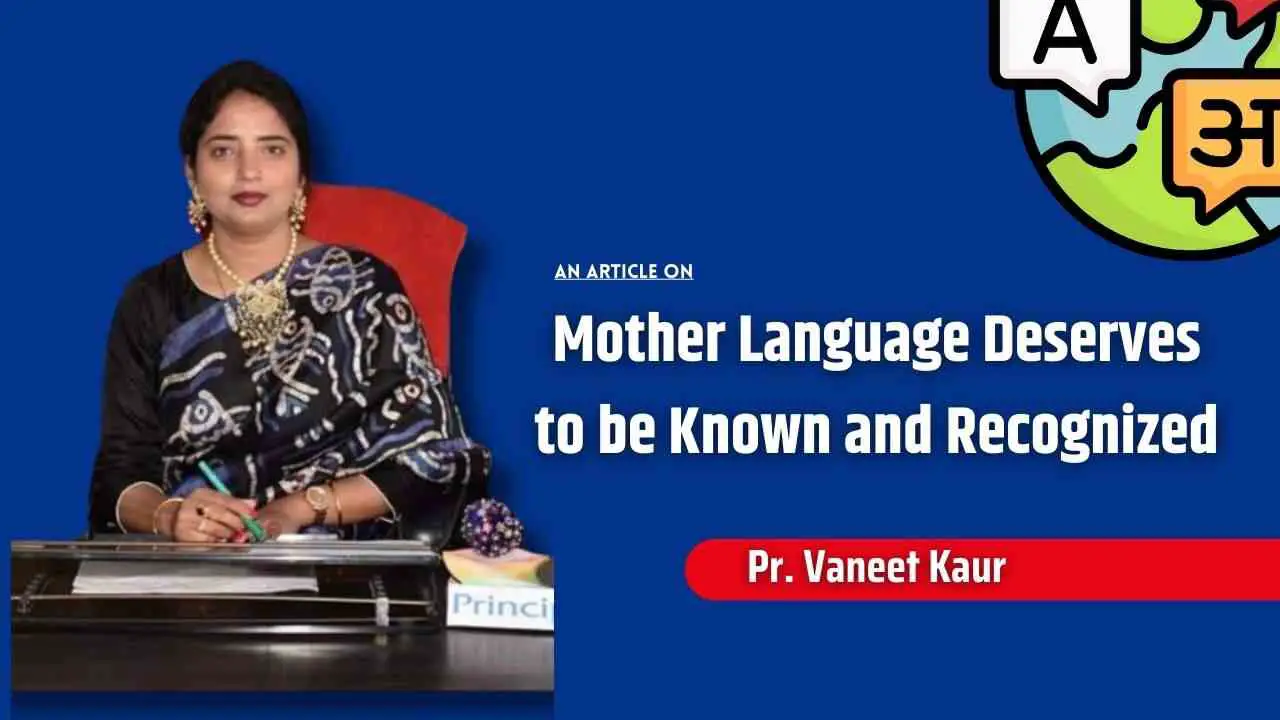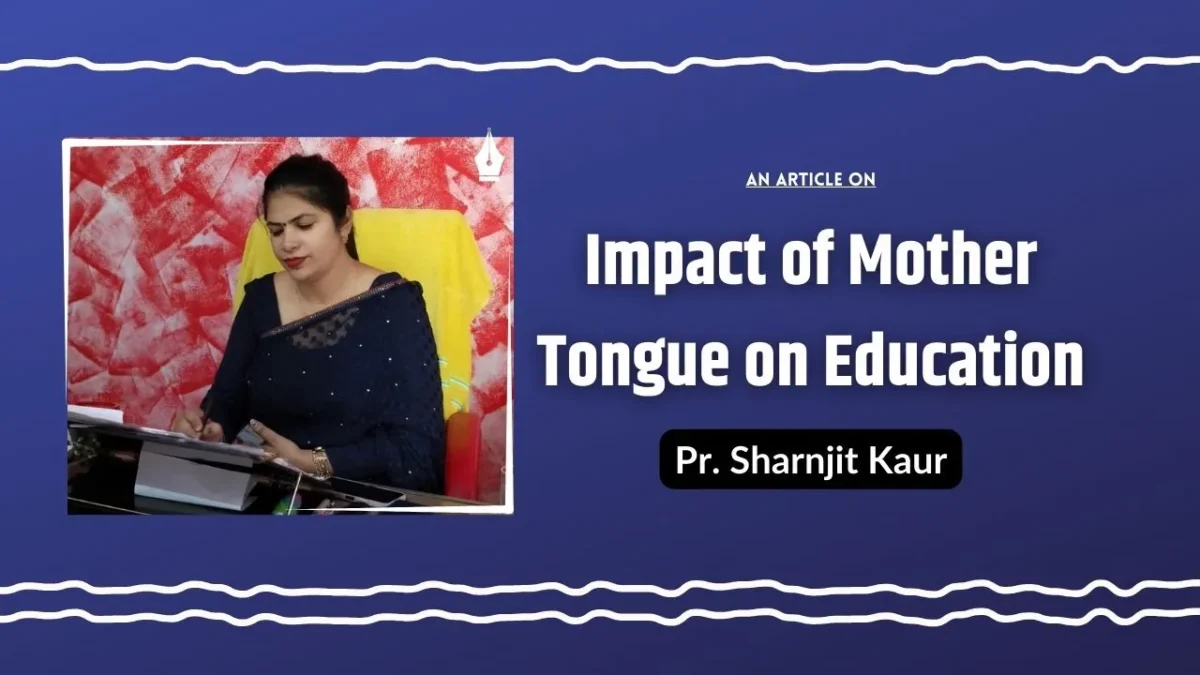The Importance of Mother Language in Education
Language is the best thing in human life. It is the only language with the help of every human being that can express his feelings and communicate with each other. Language is a gift of GOD to human beings. It describes the behaviour, style, expression, and thoughts of a human being.
The Role of Mother Tongue in Cognitive Development
The education and development of a nation are mostly related to each other. Education contributes to economic growth, poverty reduction, reduction in inequalities, and culture development. Having a strong mother language always leads to a much better understanding. Mother Language always affects the academic achievement of a child.
Mother’s tongue is like a world to a child because a child always thinks dreams and counts in his mother tongue. A child who learns in their mother tongue gives maximum output and result. With the help of the mother tongue, a child critically evaluates, visually imagines, and calculates the maximum.
Mother Language and Academic Achievement
The Effectiveness of a mother tongue-based education is always improving the learning outcomes of a child. “Education for all” is possible only when the mother tongue is used at a child’s early age. The use of mother tongue in learning helps to save the student’s future and the development of the country.
UNESCO has encouraged mother tongue-based instruction in primary education since 1953 (UNESCO, 1953), and also it highlights the advantage of mother tongue education. The use of mother language reduces classroom anxiety by giving them a voice.
Students, who use their mother tongue in the classroom for their basic education, develop good general linguistic proficiency. Learning in MT in the classroom increases the overall development of a child. When students learn in their mother tongue, they think more effectively and perform better. The Country that preserves its mother-tongue instruction can prevent the death of many indigenous languages.
The Impact of Mother Tongue on Society

| Article By | Mrs. Vaneet Kaur |
| Designation | Principal |
| Organization | National Public School, Tarantarn |
Strengthening Cultural Identity Through Mother Language
Studying in the language they know allows the children to build a strong foundation, which then enables them to make an effective transition into other national or international languages in due course. “It’s Myth that local languages cannot express modern concepts.”
Mother Tongue as a Foundation for Future Leaders
M.T. based education is essential for children, which is guaranteed by N.E.P. (2020). Learning in the mother tongue strengthens the feeling of equality in society. Mother tongue instruction facilitated the use of effective teaching practices in the classroom.
Challenges and Solutions in Mother Tongue Education
Overcoming Barriers to Mother Tongue Instruction
India has diverse languages, and every mother language deserves to be known, recognized, and given greater prominence in all spheres of public life. Don’t run behind foreign languages. Foreign languages dominate mother tongue. Learn new languages but not at the cost of the mother language.
Implementing Mother Tongue-Based Learning in Diverse Classrooms
Schools, Parents, and Teachers should encourage students to speak in their mother tongue. The right of learning in mother tongue is a controversial point across the country as we know that our country is diverse in nature and more than 80 languages are used.
Mother Tongue and Global Perspectives
Mother Tongue in the Context of Globalization
This article helps the government and organization, which are engaged in trainings and policy-making. With the use of bilingual and multilingual education, it improves and gives the better result to every child.
Balancing Mother Tongue with International Languages
This article helps the school community to adapt the mother language as the first language. It also improving the quality of education. It makes a child strong in mental as well as social bonding. If a child learns in mother language at the primary level, then a child learns more and more.
Policy and Advocacy for Mother Language Education
The Role of Government and Policy in Promoting Mother Tongue
Learning in mother language always boosts the self-confidence of a child. Mother Language cannot be put in the languages of minorities or local groups. In this regard, the significance of this article is to promote the use of mother language in the primary stage of a child.
Community Involvement in Mother Tongue Education Programs
This study could help the students to learn more and grow more. This study can help the students to transmit their culture. This study can help students to explore their talent. This study can help students to make maximum use of their ideas and creativity.
Mother tongue can be the medium of instruction, but English must stay (Raj Lakshmi Ghosh, 2020) the discussion on whether the mother tongue would be the best medium of instruction to teach primary school children. Government always promoting learning in mother language in primary stages according to (NEP, 2020).
It’s not against the English Language; the idea is to strengthen the mother languages of the state and the culture of that particular stage. Benefits of Mother Tongue in the Adult ESL Classroom (Enoka Makulloluwa, 2016) According to this finding, an individual’s mother language exerts a positive influence on a child learning of a second language, due to the ability to create a learner-centered, anxiety-free, and low-risk classroom environment.
Mostly people say that learns in mother language are not able to face the world and grow properly. But this is not a fact; when a child will grow with learning in mother language: learn more and grow more. The mother tongue has an influence on every aspect of the decoding process of a second language including phonetics, sentences, and text comprehension. If a child is strong in the mother language, then a child can easily learn any other languages as well. Its show the capabilities of a child.
All policy maker has to look into this matter. As according to NEW EDUCATION POLICY 2020 it is the right of every child to learn in his mother language, but it is not implemented in the school diaries. We have to save the fruit of mother language for our new generations.
A child will learn faster if he learns in the mother language. Mother language not only improves the level of understanding, it’s also transmits the culture of the child. It improves the future of the country and grow more and more. If both languages (Mother Language and English) are brought together, students will learn quicker and easily, without English taking a backseat.
Researches have shown that children’s first language is the optimal language for literacy and learning throughout primary school (UNESCO, 2008a). UNESCO has encouraged mother tongue instruction in primary education since (UNSESCO,1953) and UNESCO highlights the advantages of mother tongue education right from the start, children are more likely to enroll and succeed in school (Kosonen,2005); parents are more likely to communicate with teachers and participate in their children’s learning (Benson,2002); girls and rural children with less exposure to a dominant language stay in school longer and repeat grades less often (Hovens,2002; UNSESCO Bangkok,2005) and children in multilingual education tend to develop better thinking skills compared to their monolingual peers (e.g, Bialystok,2001 ;Cummins,2000 ;King & Mackey,2007).
References
Amy Perez (2015). the effectiveness of a mother tongue-based education to improve learning outcomes and second language acquisition https://www.academia.edu/download/55894424/rrl1.pdf
Angelina N Kioko1*, Ruth W Ndung’u2, Martin C Njoroge2, and Jayne Mutiga3 (2014). Mother tongue and education in Africa: Publicizing the reality, https://link.springer.com/article/10.1186/s13616-014-0018-x
Alatis J. E. (1980). Current Issues in Bilingual Education Georgetown University Press Washington, D.C [Google Scholar]
Akpabio. M. Effiong(2013). The Role of Mother Tongue in Early Childhood Education, https://core.ac.uk/download/pdf/234634871.pdf
Benson, M. (1985). South Africa: The Struggle for a Birthright, London: International Defence and Aid Fund for Southern Africa. [Google Scholar]
B.Onabanjo University, Nigeria (2018). Mother Tongue and Learning Environment as Students’ Predictors of Academic Achievement in Reading Comprehension, https://j.ideasspread.org/index.php/ilr/article/view/79
B, Bill; Penguin Books (2009). Mother Tongue. https://www.penguin.co.uk/books/56790/mother-tongue/9780141040080
For the Latest Educational News (CBSE, ICSE, and State Board News) and live news updates, like us on Facebook or follow us on Twitter and Join our Premium TelegramChannel. Read more on Latest Exams & Results News on Shikshapress.com.






